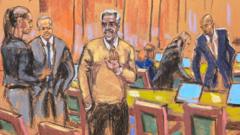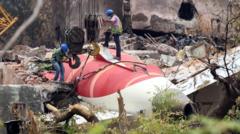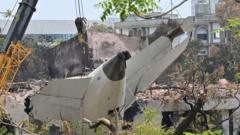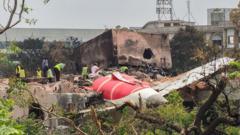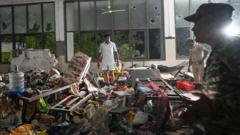Survivors of sexual abuse in the Catholic Church are questioning Pope Francis' reforms and response to the clergy's abuse of children as cardinals prepare to elect a new pope. Many feel the Church has not gone far enough in addressing the ongoing issues and holding abusers accountable.
Survivors Voice Dissatisfaction with Pope Francis' Handling of Sex Abuse Cases

Survivors Voice Dissatisfaction with Pope Francis' Handling of Sex Abuse Cases
As the Catholic Church prepares for a new pope, abuse victims express that more could have been done to address the clergy's sexual exploitation of children under Pope Francis' watch.
In the shadow of the Catholic Church's election for a new pope, pressing questions about Pope Francis' legacy arise, particularly concerning the handling of sexual abuse cases within the clergy. While proponents argue that he has made significant strides in reforming Church procedures and acknowledging victims, many survivors assert that his actions have been insufficient.
Take the story of Alexa MacPherson, who endured sexual abuse at the hands of priest Peter Kanchong from the age of three. The abuse continued for six years, culminating in her father's discovery of an attempted assault. While legal proceedings were initiated, the Church's influence loomed large over the situation. An alarming letter authored by then-Archbishop Bernard Law revealed attempts by the Church to protect the priest and avoid public scandal, rather than support the victims.
Reflecting on the decades since her abuse, MacPherson points out that systematic issues of child exploitation persist unchecked. Though she acknowledges the positive efforts made by Pope Francis, she insists that more needs to be done, particularly concerning transparency and accountability within Church hierarchies.
MacPherson's case, along with hundreds of others brought to light in the Boston Globe's investigative reports, showcased the Church's persistent issues surrounding secrecy and the reluctance to formally acknowledge victims' suffering. While Pope Francis has made adjustments to some policies, critics argue that these changes lack the necessary reach to compel full disclosure of abuse cases or ensure criminal accountability for offenders.
Looking ahead, MacPherson and other survivors retain skepticism about the Church's will to reform, especially as the selection of a new pope unfolds. The legacy of silence, cover-ups, and a failure to confront the truth of sexual abuse within the Church presents a daunting challenge ahead. As MacPherson emphasizes, true progress can only be achieved through acknowledging past wrongs and enacting meaningful reforms to protect the innocent within the fold of the Catholic faith.
Take the story of Alexa MacPherson, who endured sexual abuse at the hands of priest Peter Kanchong from the age of three. The abuse continued for six years, culminating in her father's discovery of an attempted assault. While legal proceedings were initiated, the Church's influence loomed large over the situation. An alarming letter authored by then-Archbishop Bernard Law revealed attempts by the Church to protect the priest and avoid public scandal, rather than support the victims.
Reflecting on the decades since her abuse, MacPherson points out that systematic issues of child exploitation persist unchecked. Though she acknowledges the positive efforts made by Pope Francis, she insists that more needs to be done, particularly concerning transparency and accountability within Church hierarchies.
MacPherson's case, along with hundreds of others brought to light in the Boston Globe's investigative reports, showcased the Church's persistent issues surrounding secrecy and the reluctance to formally acknowledge victims' suffering. While Pope Francis has made adjustments to some policies, critics argue that these changes lack the necessary reach to compel full disclosure of abuse cases or ensure criminal accountability for offenders.
Looking ahead, MacPherson and other survivors retain skepticism about the Church's will to reform, especially as the selection of a new pope unfolds. The legacy of silence, cover-ups, and a failure to confront the truth of sexual abuse within the Church presents a daunting challenge ahead. As MacPherson emphasizes, true progress can only be achieved through acknowledging past wrongs and enacting meaningful reforms to protect the innocent within the fold of the Catholic faith.



